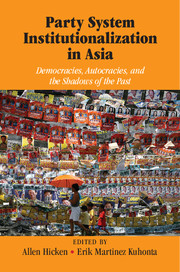Book contents
- Frontmatter
- Dedication
- Contents
- List of Figures
- List of Tables
- List of Contributors
- Acknowledgments
- 1 Introduction: Rethinking Party System Institutionalization in Asia
- 2 The Antidemocratic Potential of Party System Institutionalization: Malaysia as Morality Tale?
- 3 Institutionalized Succession and Hegemonic Party Cohesion in Singapore
- 4 Party System Institutionalization in Japan
- 5 Long in the Making: Taiwan’s Institutionalized Party System
- 6 The Making and Unmaking of the Communist Party and Single-Party System of Vietnam
- 7 The Institutionalization of the Communist Party and the Party System in China
- 8 Party System Institutionalization in India
- 9 Party and Party System Institutionalization in Cambodia
- 10 Explaining Party System Institutionalization in Indonesia
- 11 South Korea’s Weakly Institutionalized Party System
- 12 Thailand’s Feckless Parties and Party System: A Path-Dependent Analysis
- 13 Party and Party System Institutionalization in the Philippines
- 14 Party System Institutionalization: Reflections Based on the Asian Cases
- Index
- References
2 - The Antidemocratic Potential of Party System Institutionalization: Malaysia as Morality Tale?
Published online by Cambridge University Press: 18 December 2014
- Frontmatter
- Dedication
- Contents
- List of Figures
- List of Tables
- List of Contributors
- Acknowledgments
- 1 Introduction: Rethinking Party System Institutionalization in Asia
- 2 The Antidemocratic Potential of Party System Institutionalization: Malaysia as Morality Tale?
- 3 Institutionalized Succession and Hegemonic Party Cohesion in Singapore
- 4 Party System Institutionalization in Japan
- 5 Long in the Making: Taiwan’s Institutionalized Party System
- 6 The Making and Unmaking of the Communist Party and Single-Party System of Vietnam
- 7 The Institutionalization of the Communist Party and the Party System in China
- 8 Party System Institutionalization in India
- 9 Party and Party System Institutionalization in Cambodia
- 10 Explaining Party System Institutionalization in Indonesia
- 11 South Korea’s Weakly Institutionalized Party System
- 12 Thailand’s Feckless Parties and Party System: A Path-Dependent Analysis
- 13 Party and Party System Institutionalization in the Philippines
- 14 Party System Institutionalization: Reflections Based on the Asian Cases
- Index
- References
Summary
To an extent unusual for Southeast Asia, parties structure Malaysian political life. These parties perform all the functions they are supposed to: they represent and organize groups in society, channel and express interests, and significantly structure social and economic as well as political life. Nearly all those parties most active and supported now are long-standing and organizationally solid; all claim a reasonably high degree of institutionalization. Moreover, by the terms of the literature engaged here, Malaysia has a strongly institutionalized party system, or “set of patterned interactions in the competition among parties.” Malaysian parties at least officially accept and follow established rules in electoral contests; the ranks of primary contenders are reasonably stable, rooted in society and organizational life, and ideologically consistent; and the same set of parties tends to hold its niche in government. Though parties themselves suffer crises, the systems holds – and generally, the same party or a dominant faction regenerates post-crisis and returns to the fray within the span of a single election cycle. Based solely on its lattice of parties, the Malaysian polity seems well positioned to support a democratic government: although party system institution need not yield democratization in any teleological way, party strengthening is commonly presumed to be a path toward developing and buttressing representative, accountable institutions.
And yet Malaysia could hardly be considered a liberal democracy. Malaysia and Singapore “are the dogs that haven’t barked”: their dominant party systems have not yielded to more competitive alternatives, as their ruling parties have remained unified overall, and their regimes highly resilient. Parties in Malaysia observe established rules for electoral competition to an extent, but not only are these rules arguably skewed (e.g., by limits on free speech and assembly) but also breaches by the dominant coalition go unchecked.
- Type
- Chapter
- Information
- Party System Institutionalization in AsiaDemocracies, Autocracies, and the Shadows of the Past, pp. 25 - 48Publisher: Cambridge University PressPrint publication year: 2014
References
- 4
- Cited by

